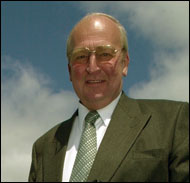 Seymour Manufacturing International Ltd (SMI), established in the early 1980s, manufactures and supplies their market leading Tempro® thermal insulation systems, which can be found here and in 15 other countries. Seymour’s Tempro is a unique lightweight insulation, that has exceptional thermal properties and is widely used in food retailing and logistics, for applications such as chilled and frozen food trolley covers, Cold Stop thermal door strip curtains for chillers and freezer entry doors, Tempro Control Zone curtains (TCZ), box liners, box covers, pallet covers, and for retail store home delivery services. Tempro’s major UK retail customers include the major supermarkets, who recognise the effectiveness of the different versions of Tempro insulation and the substantial energy savings they deliver. Seymour Manufacturing continues to innovate and is set to launch more new products in 2009 on stands H55 and J50 at the RAC Show. Brian Seymour, the company’s Chairman, spoke to The Grocery Trader.
Seymour Manufacturing International Ltd (SMI), established in the early 1980s, manufactures and supplies their market leading Tempro® thermal insulation systems, which can be found here and in 15 other countries. Seymour’s Tempro is a unique lightweight insulation, that has exceptional thermal properties and is widely used in food retailing and logistics, for applications such as chilled and frozen food trolley covers, Cold Stop thermal door strip curtains for chillers and freezer entry doors, Tempro Control Zone curtains (TCZ), box liners, box covers, pallet covers, and for retail store home delivery services. Tempro’s major UK retail customers include the major supermarkets, who recognise the effectiveness of the different versions of Tempro insulation and the substantial energy savings they deliver. Seymour Manufacturing continues to innovate and is set to launch more new products in 2009 on stands H55 and J50 at the RAC Show. Brian Seymour, the company’s Chairman, spoke to The Grocery Trader.
The Grocery Trader – When was Seymour Manufacturing as it is now set up, and who by?
I set up the embryo development company Seymour Systems in the early 1980s and after a short time I was joined by Dale Humphries, who is still a major part of the team and a Director. We have grown a lot since then, but our current premises near Telford are not far from our original office and warehouse where we started. SMI’s roots go back through the development company, Seymour Systems and beyond to the emerging supermarket industry in the 1950s. Everything I do has always been centered around the environment, saving money and the changing, just-in-time delivery cool chain: everyone is making extravagant claims about green issues now, but I have been consistently looking at ways of saving energy and money for over fifty years.
GT – When did you get involved in the business?
I started my career with The Goodyear Tyre & Rubber Company, Wolverhampton, where I undertook their two year rubber technology course in the factory and offices; a form of apprenticeship which I completed in fifteen months, I quickly moved into the Films and Chemicals division and then into sales where I became a sales ‘hitman,’ with the responsibility of building up business for manufacturing equipment that was no longer used or not running at full capacity. I also helped to develop and sell the new rubber hydrochloride and PVC packaging film. I was their youngest ever salesman and built my sales from £50,000 in the first year to £3.5m in the second with continued growth until my resignation to start my own business.
GT – What is your role from day to day?
As Chairman I try hard to sit back from the day-to-day running of the firm and focus on new product development, but I am also actively involved in selling our current products and talking to people on site. Nearly everyone in the office receives copies of my emails, so they are in the loop, responding and working with me.
I only work 10 hours a day now and have a home office linked to the server so I stay in touch, but work is also a hobby for me and a pleasure. I have become more philosophical about the company but I still worry. All SMEs are at the sharp end with no fall back position, and I feel a strong responsibility for my team and try hard to protect their jobs..
GT – What have been your major landmarks over the years?
Since the early 1980s I have pioneered energy-saving products and have been successful in supplying many industries with simple solutions to their temperature maintenance problems.
When I set up the package deal to emerging supermarkets years ago, I was involved in food preparation and packaging, where the priority was to switch people to stretch cling film with its improved sales appeal to customers instead of cellophane. I developed the first meat netting and the first semi-automatic machine for it, also fresh produce netting and equipment. When my sales of EPS trays reached 100,000,000 per annum LINPAC Plastics, who made them, bought two of my businesses, Seymour Packaging and Nationwide Packaging Distributors. I registered Seymour Systems and developed the new TEMPRO thermal protection range and modular equipment. I have always kept one foot in the ‘metal bashing industry’ but my primary focus was, and still is, storage and transportation of chilled and frozen products from A to B without excessive refrigeration and associated costs. In a part thermal development and to reduce the use of plastic carrier bags, I developed with Waitrose their Quick Check trolley bag system.
GT – Who else is in the management team now besides you?
There is one other director, Dale Humphries, who is my number one, and I have a management and export consultant David Nichols, who works with the team two days a week currently, then we have our office manager, Caroline Jones, a wonderful character and staunch supporter of SMI, who keeps us in place and is always there to help. We develop our products here in the UK and manufacture around the world: two factories in China make our mass-produced items and we make short-run, specialist items here in the UK. We like to remain loyal to our suppliers and have a good working relationship with them.
GT – How would you summarise SMI now as a business?
We are comparatively small, but one of the world’s leading thermal insulation suppliers for the protection of food, chemicals, agricultural and home delivery products, serving a variety of organizations with products and systems of the highest standard.
We are poised to grow at home and abroad with products aimed at the same market and mainly in the same industries. We regularly compare our materials and have them tested.
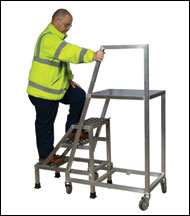 GT – How do you sell your products and solutions in the UK – do you sell direct or through distributors?
GT – How do you sell your products and solutions in the UK – do you sell direct or through distributors?
I have two National Account Managers in the UK: James Campbell handles the North, and Stephen Reed the South, with a third about to be appointed to work in the Midlands area. The National Account Managers negotiate with retailers’ head offices and their buying agents and manufacturing partners. They are not just sales people, they match our products to the need of the user to save energy and costs.
GT – How big is SMI in the UK in turnover terms? Where are you based? How many people do you employ here?
In our industry I would like to think we are the market leaders, with a seven- figure turnover and growing. We work from a half timbered 17th century building in a village called Sutton Maddock, near Telford. We have 12 full time employees and growing in the UK, and also call on subcontractors as needed.
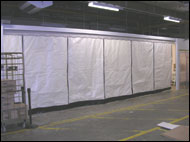 GT – Which other countries do you sell in?
GT – Which other countries do you sell in?
As well as our UK base we are active in France, Germany, Spain, Portugal, Poland, Czech Republic, Switzerland, Belgium, The Netherlands, Ireland, Sweden, Slovakia, and South Africa.
We have just sold our first Cold Stop curtains to Wal-Mart in South America. We have sold to most other retailers in the UK and have recently enjoyed a very successful exhibition at Intercool, Germany.
GT – What kind of energy savings can be achieved with Tempro? What annual savings in cash terms is this equivalent to?
Generally the minimum energy saving with Tempro Cold Stop curtains is 33 1/3 % in freezers and 25% in chillers. We understand that one supermarket chain saved over £15m in a single year, thanks to us.
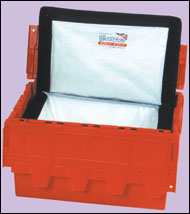 GT – Which products are in your core range?
GT – Which products are in your core range?
Our portfolio includes Tempro roll cage covers, Track Rack racking and trolley systems, box liners and thermal bags, Tempro adjustable pallet covers, Tempro Cold Stop Curtains and TCZ’s, an instant cold room using curtains on a track. Back Stop prevents energy being lost from the back of vehicles when the rear doors are open. There is the Standard Tempro Dome, an inflatable cold room, as well as the metal range, the Safe 2-step/3-step and many other trolleys and our metal accessories.
GT – Which are the biggest sellers?
Cold Stop curtains are typically 40-50% of our turnover because of the great energy savings they offer, to say nothing of the very real reduction of the customers carbon foot-print, with Cold Stop’s energy savings and green issues driving demand. Our main industries are food manufacturing and retail, as well as logistics and storage.
GT – Are all your products standardised, or do you offer a tailored service?
There are many products in the SMI range, most of which can be adapted for large orders. Our Thermal covers are bespoke. Our Cold Stop curtains are 2.1m high as standard, but we can produce up to 5m high or more, in varying widths. We are totally versatile: the major retailers have their own requirements, which we meet. Most of our pallet covers are ex-stock in UK and Euro pallet sizes with a unique adjustable height system.
GT – Have any of your ‘core’ products been born from a client requesting a tailored solution?
Yes, we tend to identify a need and go to a customer to talk to them about it. Cold Stop curtains, for example, were originally developed in the early 1990s and stayed on the drawing board before we supplied our first major customer. Morrisons’ Senior Refrigeration Engineer Colin Coe asked James Campbell, our National Accounts Manager North, whether SMI produced anything that eliminated ice and its potential health hazard in cold room doorways. He worked with James to explore the possibilities. From there Morrisons also discovered the enormous energy savings, and from that point we were able to offer Cold Stop curtains to retailers here and abroad. Morrisons have always been keen to protect the environment and save energy. This is evidenced by their Green End User of the Year award recently for a heat recovery system to provide hot water at their Stockton store.
GT – Where do you develop your solutions for customers?
The technical development process starts in house, and then, if necessary, we bring in outside experts. Dale Humphries plays a key part in producing drawings.
GT – Are there competitors producing similar products on the market?
Yes, but I make sure we stay ahead! They cannot imitate our patents, such as the Tempro header. Everyone we deal with signs a letter of confidentiality, but there is always someone who wants to copy us to the point of sifting through our waste paper in our outside skip. We have seen very poor counterfeits of Tempro products here and in Germany.
GT – How important is innovation to your company?
Innovation is vital. SMI operates a programme of continuous development in conjunction with its customers, ensuring we keep up to date with technological developments. We were told by Business Link Midlands that we invest more in R&D than any other company they deal with.
GT – As a company do you carry out your own installations, or do you sub-contract?
It depends on the contract: we can work with customers’ own refrigeration contractors or in house teams as required, or with refrigeration manufacturers.
GT – Which sectors are your industry customers in?
We can help any customer who has temperature sensitive products, and there are many of them. In the defence sector for example, Tempro is used for logistics services, temporary buildings and specialist applications in aerospace. Tempro is lightweight, thermal image-proof and superior to anything similar in the world. You can hide any heat source behind or under it.
GT – What proportion of your business is food retail and manufacturing?
Supermarkets and the supply chain are 80% of our business. At least one major retailer says they are bypassing refrigerated vehicles and cold rooms, thanks to us.
 GT – One of your leading products is the Tempro Dome temporary cold store. What is this? How big is it?
GT – One of your leading products is the Tempro Dome temporary cold store. What is this? How big is it?
Tempro Domes are inflatable temporary cold rooms/storage facilities 6 metres by 4 metres long, in interlocking modules. A typical example of an application is temporary chilled storage at times of peak demand, when there is never sufficient cold storage. We have some 100 Domes in use and up to 50 Tempro Domes on rental in the UK through Dawsons Rental. Some major supermarkets buy Tempro Domes and move them around the UK as required.
GT – How quickly can you deliver these? How long do they take to get set up and working?
Tempro Domes pack down small enough to fit two into a light van, and we can supply them next day direct, to buy or on hire through Messrs Dawson Rentals. Set up, including sweeping the site beforehand, which we strongly recommend, takes one hour maximum, including 15 minutes to reach the required temperature.
GT – How environmentally friendly are your products? Are there tax breaks for companies installing them?
Our products are very environmentally friendly. We have a strict recycling procedure, and can often repair many of our products to provide our customers with what could be a double life cycle. Failing that, we take back products that are beyond economic repair and recycle them. We were the first in our industry to gain the ECA Award, whereby our customers can claim 100% tax relief on their expenditure on our product in the first year. We were also awarded ECA certification for our Temperature Controlled Zone. Sadly, the ECA certification classification system is currently under review.
GT – How easy are your products to maintain?
All our products are easily cleaned, anti-fungicidal, of hardwearing construction and UV stabilized. As a further benefit we are introducing flame retardant technology to most of our products and, as previously stated, we can often repair damaged products.
GT – How long do they last for?
Many Tempro products we sold years ago are still providing excellent service, but it depends entirely on how the product is treated and maintained.
GT – Have you won any awards for innovation or export?
We won a Spanish award for the ‘Idea of The Year’ six years ago and have been in the finals for other initiatives. That said, we prefer to service our customers, not serve ourselves by entering awards!
GT – What industry standards are your products made to?
We validate our thermal claims through Campden & Chorleywood Food Research Association and the Building Research Establishment. Tempro retains its thermal efficiency throughout its lifetime. We also supply to ISO and BSI standards and naturally hold the range of engineer requirements CSCS, Working at Height etc.
GT – You’ve just revealed a new livery. What is the rationale behind that?
The new ID is an update to our previous identity, masterminded by Dale Humphries and David Nichols. We have not changed strategy but sometimes one needs a new suit and haircut – it also reflects our expansion plans for 2009.
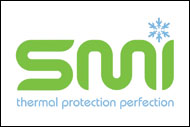 GT – What do you see as the biggest opportunities for Seymour, here and worldwide?
GT – What do you see as the biggest opportunities for Seymour, here and worldwide?
There are opportunities everywhere. It is a good time for SMI to grow: there is always someone out there to help or a problem to overcome, and with a bigger range of products that save costs, we are well equipped to tackle those problems and save our customers money. We want more customers everywhere. We are setting up negotiations in South Africa and Australia, and we have just secured business in two other countries, which will open further doors.
GT – Where do you see Seymour Manufacturing International going from here?
Forwards! If anyone would like to find out more, please visit our two stands H55 and J50 at the RAC exhibition NEC Birmingham 24th to 26th February 2009. We are introducing two new products and would welcome your visit; other than that, please visit our web site, www.seymour-mi.com.
Seymour Manufacturing International
Tel: 01952 730630
www.seymour-mi.com




Comments are closed.